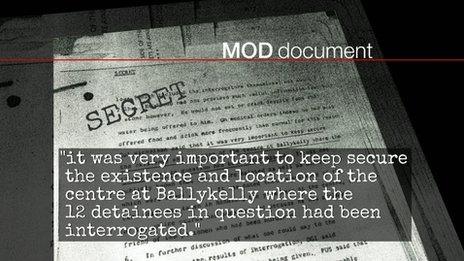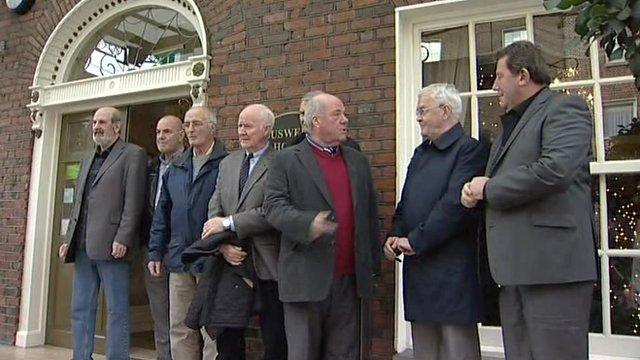Hooded men: Irish government bid to reopen 'torture' case
- Published
Nine of the original "hooded men" were in Dublin recently to hear a call for the Irish government to take the UK to the European Court
The Irish government will ask the European Court to revise its judgement in the case of a group of men who said they were tortured in Northern Ireland.
Those who became known as the hooded men claimed they had been tortured after being interned in 1971.
In 1978, the European Court found that the UK had carried out inhuman and degrading treatment - not torture.
A Northern Ireland Office spokeswoman said the UK government was considering the implications of the Irish decision.
The Irish foreign affairs minister said he took the decision to go back to the European Court of Human Rights following a review of thousands of documents.
Charlie Flanagan said the Irish "government is aware of the suffering of the individual men and their families, of the significance of the case and of the weight of the allegations.
"On the basis of the new material uncovered, it will be contended that the ill-treatment suffered by the hooded men should be recognised as torture.
"The government's decision was not taken lightly. As EU partners, UK and Ireland have worked together to promote human rights in many fora and during the original case, the UK did not contest before the European Court of Human Rights that a breach of Article 3 of the European Convention of Human rights took place."
'Deep interrogation'
Fresh information came to light in a television documentary, The Torture Files, by Irish broadcaster, RTÉ
It stemmed from documents held in the UK public records office in London.
The men, arrested under the policy of internment in 1971, were taken to a secret location and subjected to what was called "deep interrogation".
It has since been confirmed the secret location was Ballykelly Army base.
On their way to the interrogation centre in 1971, the men were hooded and thrown to the ground from helicopters.
They had been told they were hundreds of feet in the air, but were actually just a few feet from the ground.
They were then subjected to what the Army referred to as "the five techniques".
They were beaten, deprived of sleep, food and water, and forced to stand in a stress position against a wall for long periods.
'Terrible suffering'
While all of the men were interned, none was ever convicted.
The Ministry of Defence has consistently rejected allegations that it used torture.
It has also pointed out that it has "always fully co-operated" with statutory inquiries.
The Northern Ireland Office spokeswoman said: "When the case was heard back in the '70s, the UK government did not seek to justify treatment experienced by the individuals commonly referred to as 'the hooded men'.
"These events took place many years ago. This government adopted a Strategy for the Prevention of Torture in 2011 and this remains one of our global human rights priorities.
"Whatever the outcome of this litigation, there remains a pressing need for an agreed way forward on Northern Ireland's troubled past, which addresses the needs of victims and survivors."
Colm O'Gorman, the executive director of Amnesty International Ireland, welcomed the Irish government's decision.
"We commend Ireland for helping these men, and the families of those who have since died, to finally have their right to truth and justice vindicated for what we now know happened to them in 1971," he said.
"The UK withheld from the European Court what it knew about the terrible suffering deliberately inflicted on them and its being sanctioned at the highest levels of the UK government."
Sinn Féin leader Gerry Adams welcomed the decision.
"There is an onus now on the Irish government to ensure that it prepares the most thorough, exhaustive, well-argued case that it can in support of the 14 men and of the government's challenge before the European Court of Human Rights," he said.
- Published28 November 2013

- Published24 November 2014

- Published24 November 2014
